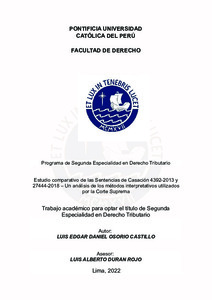| dc.contributor.advisor | Durán Rojo, Luis Alberto | |
| dc.contributor.author | Osorio Castillo, Luis Edgar Daniel | |
| dc.date.accessioned | 2023-05-09T18:25:37Z | |
| dc.date.available | 2023-05-09T18:25:37Z | |
| dc.date.created | 2022 | |
| dc.date.issued | 2023-05-09 | |
| dc.identifier.uri | http://hdl.handle.net/20.500.12404/24939 | |
| dc.description.abstract | Los criterios jurisprudenciales de la Corte Suprema sobre la aplicación de los
intereses moratorios aplicables a los pagos a cuenta mensuales del Impuesto a
la Renta resultan una guía necesaria para la comunidad jurídica para
interpretar las disposiciones normativas correspondientes.
Así la Casación No. 4392-2013 establecía como criterio jurisprudencial la
aplicación del método literal para interpretar el artículo 34 del Código Tributario
y el artículo 85 de la Ley del Impuesto a la Renta, concluyendo que no se
generan intereses moratorios por la rectificación de la declaración jurada anual
que sirvió para calcular el coeficiente correspondiente a las cuotas de los pagos
a cuenta, toda vez que al momento del determinación de dichos pagos se tomó
en cuenta la declaración jurada vigente del impuesto a la renta del ejercicio
anterior.
Sin embargo, este año se publicó la Casación No. 27444-2018 que propuso
una perspectiva totalmente distinta, debido a que rechaza la interpretación
literal y adopta la sistemática respecto de los citados artículos, además del
precisando que sí se deben calcular intereses moratorios para estos casos. Por
tanto, nos encontramos ante dos posturas jurisprudenciales distintas y
debemos tomar posición por alguna de ellas.
El objetivo del presente artículo es analizar comparativamente ambas
sentencias, mostrando sus aciertos y debilidades a efectos de postular una
salida a tal diferencia de criterios y aplicación de métodos interpretativos.
Consideramos que un acercamiento al enfoque constitucional puede ayudar a
dar luces y establecer un criterio más adecuado en base a lo propuesto por
ambas sentencias. | es_ES |
| dc.description.abstract | The jurisprudential criteria of the Peruvian Supreme Court on the application of
default interest applicable to monthly payments on account of Income Tax are a
necessary guide for the legal community to interpret the corresponding
regulatory provisions.
Thus, The sentence of the Supreme Court of Cassation Num. 4392-2013
established as a jurisprudential criterion the application of the literal method to
interpret article 34 of the Tax Code and article 85 of the Income Tax Law,
concluding that default interest is not generated for subsequent rectification of
the annual affidavit that served to establish the calculation coefficient of
installments of payments on account, since at the time of payment of said
payments the current income tax return from the previous year was considered.
However, this year the sentence of the Supreme Court of Cassation No.
27444-2018 was published, which proposed a totally different perspective,
because it rejects the literal interpretation and adopts the systematic one
regarding the articles, in addition to specifying that default interest must be
calculated for these cases. Therefore, we are faced with two different
jurisprudential positions, and we must take a stand for one of them.
The main purpose of this paper is to comparatively review both sentences
showing their successes and weaknesses to postulate a way out of such a
difference in criteria and application of interpretive methods. We consider that
the constitutional approach can help to establish a more appropriate criteria
based also on what is proposed by both sentences. | es_ES |
| dc.description.uri | Trabajo académico | es_ES |
| dc.language.iso | spa | es_ES |
| dc.publisher | Pontificia Universidad Católica del Perú | es_ES |
| dc.rights | info:eu-repo/semantics/closedAccess | es_ES |
| dc.subject | Recurso de casación--Perú | es_ES |
| dc.subject | Impuesto a la renta--Legislación--Perú | es_ES |
| dc.subject | Derecho tributario--Jurisprudencia--Perú | es_ES |
| dc.subject | Perú. Corte Suprema | es_ES |
| dc.title | Estudio comparativo de las Sentencias de Casación 4392-2013 y 27444-2018 – Un análisis de los métodos interpretativos utilizados por la Corte Suprema | es_ES |
| dc.type | info:eu-repo/semantics/bachelorThesis | es_ES |
| thesis.degree.name | Segunda Especialidad en Derecho Tributario | es_ES |
| thesis.degree.level | Título Profesional | es_ES |
| thesis.degree.grantor | Pontificia Universidad Católica del Perú. Facultad de Derecho | es_ES |
| thesis.degree.discipline | Derecho Tributario | es_ES |
| renati.advisor.dni | 09552537 | |
| renati.advisor.orcid | https://orcid.org/0000-0001-6200-6887 | es_ES |
| renati.author.dni | 43611273 | |
| renati.discipline | 421169 | es_ES |
| renati.level | https://purl.org/pe-repo/renati/level#tituloSegundaEspecialidad | es_ES |
| renati.type | https://purl.org/pe-repo/renati/type#trabajoAcademico | es_ES |
| dc.publisher.country | PE | es_ES |
| dc.subject.ocde | https://purl.org/pe-repo/ocde/ford#5.05.01 | es_ES |






